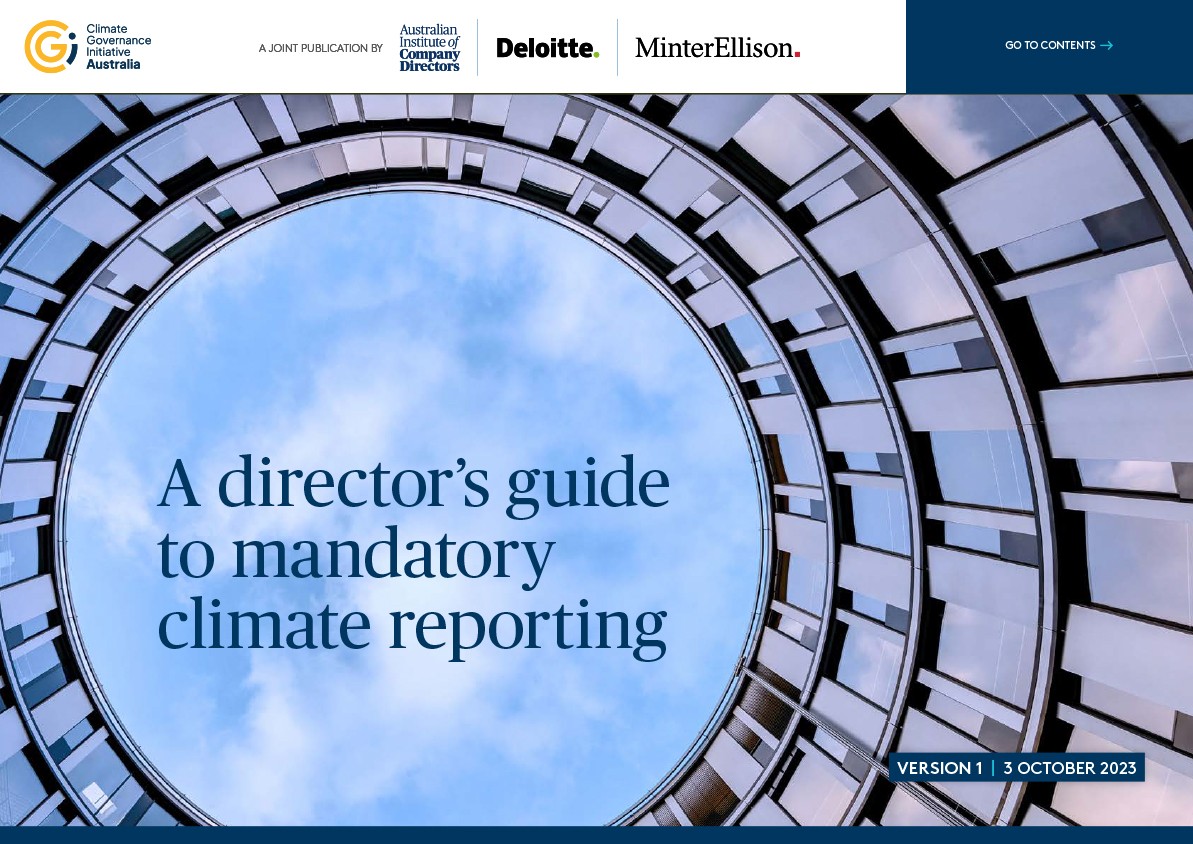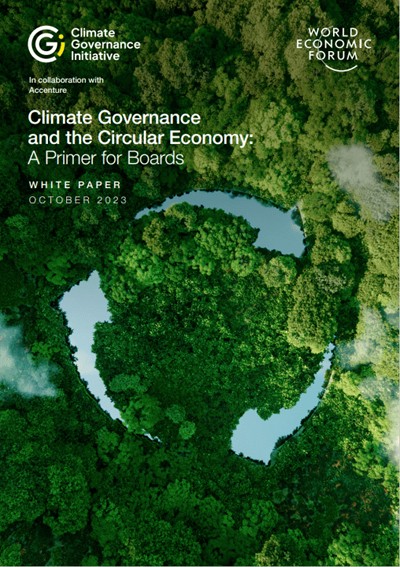This month we feature our latest publication, A director’s guide to mandatory climate reporting co-authored by AICD with Deloitte and MinterEllison. With climate reporting front of mind for boards, the Guide has quickly become one of the AICD’s most accessed publications, with more than 12,000 downloads to date.
Also in this newsletter:
- Introducing a proposed new framework for company net zero transition plans;
- Circular economy primer for company directors;
- Latest climate news, including the International Energy Agency’s pathway to keep Paris Agreement goals within reach.
Preparing for mandatory climate reporting – a director’s guide
The latest CGI resource, A director’s guide to mandatory climate reporting provides detailed and practical guidance to directors overseeing the transition to mandatory climate reporting in Australia, proposed to commence from July 2024.
It is the first comprehensive guide for Australian non-executive directors on this topic and includes a foreword from ASIC Chair, Joseph Longo commending the guide to all directors.
The Guide includes:
- An overview of the proposed Australian mandatory reporting framework;
- An introduction to the key legal obligations for directors; and
- Practical steps directors to ready organisations for the commencement of the mandatory reporting regime.
For those interested in a shortform reference, we have also released an accompanying snapshot of the Guide and a suite of fact sheets on key topics such as scope 3 emissions and the potential application of US and EU reporting requirements. The snapshot and factsheets can be accessed here.
The Guide suggests boards take steps across three areas:
Governance
- Undertake a holistic review of board committee mandates and consider other climate governance structures/processes
- Consider board climate competency and upskilling requirements
- Consider the nature and frequency of reporting to the board in light of mandatory climate reporting requirements
- Assess resourcing and prioritisation required to implement quality reporting
- Periodically review governance structures and processes.
Strategy and risk
- Identify climate-related risks and opportunities over the short, medium and long term
- Assess current and future financial and strategic effects of climate change, including through scenario analysis
- Set a climate strategy and develop a transition plan to manage risks and seize opportunities
- Oversee communication of reporting
- Monitor and periodically review the climate strategy.
Metrics and targets
- Understand your organisation’s current carbon footprint
- Identify gaps in data, processes and capabilities
- Understand, and get comfortable with assumptions, contingencies, uncertainties and judgements
- Assess assurance and/or verification options noting mandatory assurance requirements
- Monitor ongoing accuracy of targets and whether they need revision.
Disclosure Framework released for company transition plans
As part of the shift to a net zero economy, investors are increasingly demanding transition plan disclosures as part of a company’s annual reporting. The UK government established the Transition Plan Taskforce (TPT) in 2021 to develop a ‘gold standard’ for such transition plans. Two years on, the TPT has just released its internationally aligned Disclosure Framework to support a robust and credible private sector transition.
While UK-focused, the Disclosure Framework builds on the work of the International Sustainability Standards Board (ISSB) and supports compliance with the global climate standard, IFRS S2. It will be a useful resource for Australian organisations preparing transition plans as part of sustainability-related reporting, particularly in light of calls for the Australian Government to make transition plan disclosures mandatory.
This is an area where we know Australian directors would benefit from further practical guidance and will be a key focus area for AICD.
The TPT highlights three principles of good practice for company transition plans:
- Ambition: Reflect the urgency to act arising from the observed changes in the climate and the latest scientific findings about climate change.
- Action: Translate ambitious objectives and priorities into concrete steps to be taken in the short, medium and long term.
- Accountability: Fully integrate a transition plan into the entity’s organisational processes for business and financial planning, and for governance.
WEF and CGI publish a circular economy primer relevant for directors
Climate governance and the circular economy: A primer for boards was released in October by the World Economic Forum and the Climate Governance Initiative. It provides a practical understanding of the circular economy and explains how circularity can be applied to help organisations decarbonise their supply chains.
Developing a circular economy will be important for Australia’s net zero transition. It has been identified as a cross-cutting issue for all six sectors subject to the Australian Government’s sectoral decarbonisation plans.
Australian climate news
Climate Action 100+ releases assessments of 14 heavy-emitting Australian companies [report]
Climate Action 100+ has assessed the net zero transition plans of large, high emitting companies against the Net Zero Company Benchmark. Fourteen Australian companies were assessed in areas including company emissions reduction, governance, and climate-related financial disclosures. The report concluded that there had been ‘slow progress’ for the sample of Australian companies assessed, especially for climate commitments and disclosure. It found 57% of Australian companies were fully disclosing net zero commitments and 7% had short-term targets that were adequate to kick-start the transition.
Climate outweighs competition concerns in ACCC authorisation for Origin acquisition [ACCC media release]
The ACCC’s decision on 10 October to greenlight Brookfield’s proposed $18.7 billion takeover of Origin Energy is being reported as a landmark ruling, due to the benefits of Australia’s renewable energy transition outweighing anti-competitive effects from vertical integration. In a statement the ACCC said: ‘The ACCC considers that the acquisition will likely result in an accelerated roll-out of renewable energy generation, leading to a more rapid reduction in Australia’s greenhouse gas emissions.’
Government announcements
The Australia government rejoins global climate finance fund, cancels Kyoto carryover credits and released its clean energy workforce report. The report, published on 3 October 2023, includes 50 recommendations regarding the skills and workforce requirements for meeting its clean energy ambitions.
Latest in global climate news
International Energy Agency sets out a global pathway to keep the Paris 1.5°C temperature goal within reach [report]
The International Energy Agency’s has updated its influential net zero by 2050 pathway, which became a benchmark for policy makers, industry, the financial sector and civil society in 2021 when it was first released. Under the updated 1.5°C scenario, the IEA shows by 2035 global emissions decline steeply – by 80% for advanced economies and 60% in emerging markets on 2022 levels. These reductions are underpinned by a tripling of renewable energy capacity to 11,000 gigawatts by 2030, improved energy efficiency, a cut in methane emissions, and electrification. To reach the 1.5°C goal, global clean energy investment reaches USD4.5 trillion a year by the early 2030s.
CDP assesses status of mandatory environmental reporting
For a global perspective on environmental disclosure regulations, the CDP (formerly Carbon Disclosure Project) has assessed the state of mandatory environmental reporting globally, with a focus on G20 nations and key financial hubs. The report shows Australia among a growing list of countries moving towards mandatory climate disclosures for businesses and financial institutions. It finds the EU, Brazil, India and Indonesia have taken steps to expand their regimes to include more comprehensive requirements.
Sixth and final status update from the Task Force on Climate-related Financial Disclosures [report]
Next year, the ISSB will assume responsibility for monitoring company progress on climate-related disclosure, building on eight years of the Task Force on Climate-related Financial Disclosures (TCFD). The TCFD’s final status report showed progress on company disclosures: 58% of public companies disclosing five out of 11 of TCFD-aligned information, up from 18% in 2020.
European Carbon Border Adjustment Mechanism comes into play [article]
The Australian Financial Review reports the European Carbon Border Adjustment Mechanism (CBAM) came into effect on 1 October 2023. The CBAM aims to equalise the price of carbon between domestic products and imports. In its transitional phase, European Union importers are required to report – but not yet pay financial adjustments – on import volumes and embedded greenhouse gas emissions for cement, iron and steel, aluminium, fertilisers, electricity and hydrogen imports. In August, Minister for Climate Change and Energy, Chris Bowen announced the Australian CBAM review will happen ‘in parallel to the broader work being undertaken on the Net Zero 2050 plan and six sectoral plans.’
EU to ban ‘climate neutral’ claims by 2026 [European Parliament media release]
The European Union has agreed to ban environmental claims such as 'climate neutral' or 'eco' by 2026. According to the Financial Times, the rules will make the EU the 'toughest region of the world in terms of its approach to green claims made to the public'.
Coming soon – short course on climate governance
AICD is developing a short course on climate governance to support directors looking to build their knowledge and capability to respond to climate-related regulatory risks, rising stakeholder expectations and new opportunities.
Register your interest to join the waitlist and be the first to hear about the course.
Already a member?
Login to view this content




